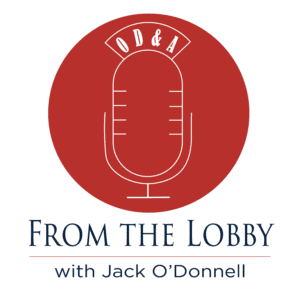Good Morning from Washington, D.C….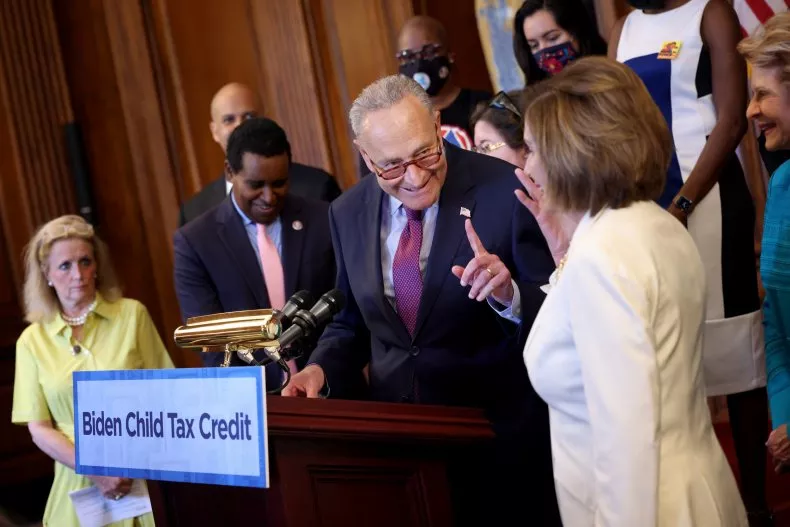
Last week, a procedural “test vote” to advance the $1.2 trillion bipartisan infrastructure package—advanced by Senate Majority Leader Chuck Schumer—failed, with the GOP blocking the Senate from moving forward, largely because there is still no bill text. Nonetheless, it appears to have achieved Schumer’s goal: pushing the bipartisan group toward a final deal. “We’re a no today because we’re not ready. We’re saying we do want to take up this bill as soon as we are, and we think that’ll be Monday,” said Senator Rob Portman of Ohio, the lead Republican negotiator shortly after the failed vote last Wednesday. Portman led a group of 11 Republican Senators in a letter to Schumer saying they would vote “yes” once the bill text is ready. Leading Democrats in the bipartisan group have echoed Portman; Senator Joe Manchin, a Democrat from West Virginia said, “We’re close. We’re getting close.”
The biggest issue? How to pay for it and the bipartisan group believes they are close to finding common ground on the necessary revenue. “We had an agreement on 99% when we walked out yesterday afternoon. The pay-fors are pretty much lined up,” said Manchin heading into the weekend. A contentious proposal on increasing IRS enforcement, which the Congressional Budget Office (CBO) estimated would have raised $40 billion, was dropped. One likely piece to pay for the plan—in part—by delaying a Trump Era Medicare regulation, which is estimated to create $177 billion. A discussion draft could be available as early as today, depending on the timeline for the CBO’s final evaluation of the proposals costs and revenue.
As lawmakers met over the weekend, a few other issues emerged: including, chiefly, how much funding should go to public transit, broadband, and a requirement that contractors on federally funded projects cannot pay their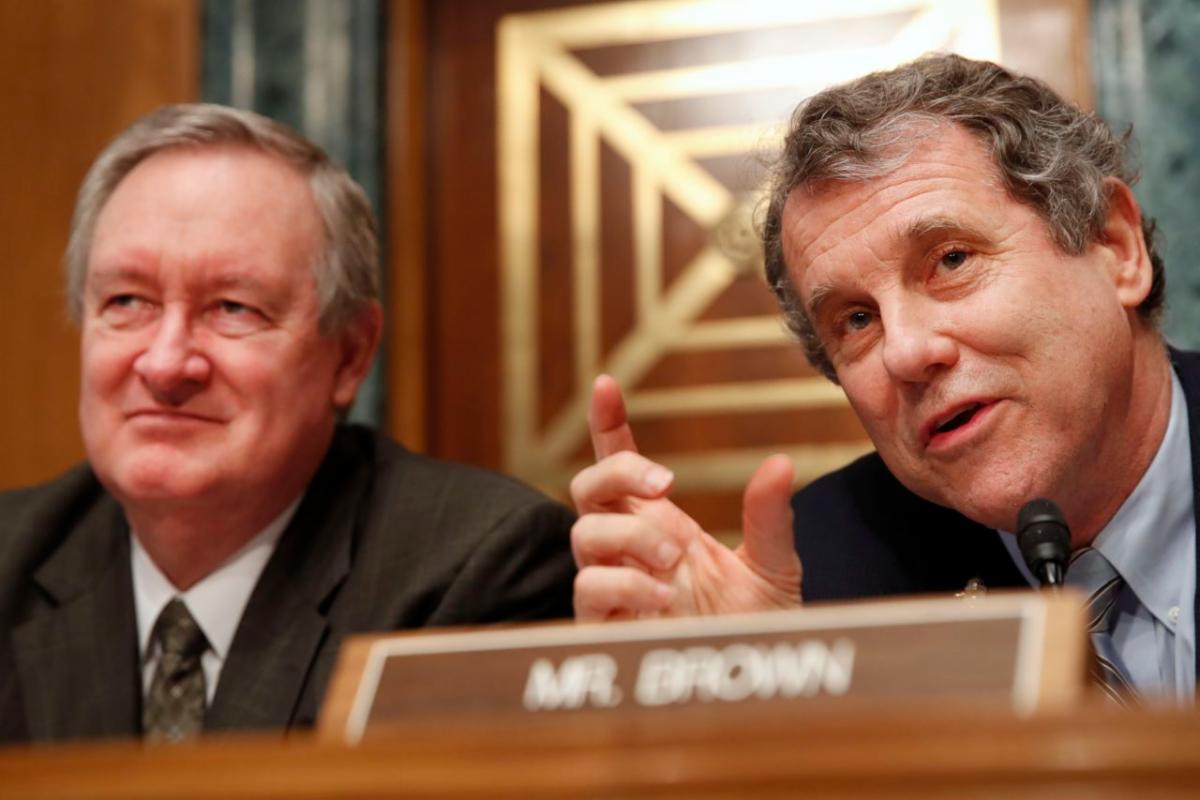 employees anything less than the locally prevailing wage. Though members of the bipartisan group expressed optimism there would still be a bill this afternoon, Democrats have been pushing to include much larger numbers for public transit and broadband. “They have not been serious about transit dollars. We’ve offered to split the difference, and they don’t seem to want to do that,” said Senate Banking Committee Chairman Sherrod Brown, a Democrat from Ohio, who oversees transit funding. However, the consensus is that lawmakers will likely move forward with a bill today and hash out the smaller issues through amendments. “We’re down to the last couple of items, and I think you’re going to see a bill Monday afternoon,” said key negotiator Senator Mark Warner, a Democrat from Virginia.
employees anything less than the locally prevailing wage. Though members of the bipartisan group expressed optimism there would still be a bill this afternoon, Democrats have been pushing to include much larger numbers for public transit and broadband. “They have not been serious about transit dollars. We’ve offered to split the difference, and they don’t seem to want to do that,” said Senate Banking Committee Chairman Sherrod Brown, a Democrat from Ohio, who oversees transit funding. However, the consensus is that lawmakers will likely move forward with a bill today and hash out the smaller issues through amendments. “We’re down to the last couple of items, and I think you’re going to see a bill Monday afternoon,” said key negotiator Senator Mark Warner, a Democrat from Virginia.
Even if an agreement in the Senate is close, the bill still faces uncertainty in getting to President Biden’s desk with opposition from both sides of the aisle. Progressives in the Senate Democratic Caucus are pushing leadership to pull away from the table and go bigger like a larger reconciliation bill through in the neighborhood of $4.1 trillion (more on reconciliation shortly). As far as Republican opposition, Senate Minority Leader Mitch McConnell has been uncharacteristically quiet thus far, whether or not he will work with the White House or try to tank the bill behind the scenes still remains to be seen. In the House, the top Democrat overseeing transportation policy—Rep. Peter DeFazio of Oregon—is warning that he will reject the Senate infrastructure package without significant changes. “There’s a whole lot of problems we have, and we’re expressing our concerns, and we want an opportunity to actually negotiate the final bill, not just be handed the Senate bill and say this is it,” DeFazio said last Tuesday.
As we have reported over the past few weeks, Democrats are pushing a two-track process of passing the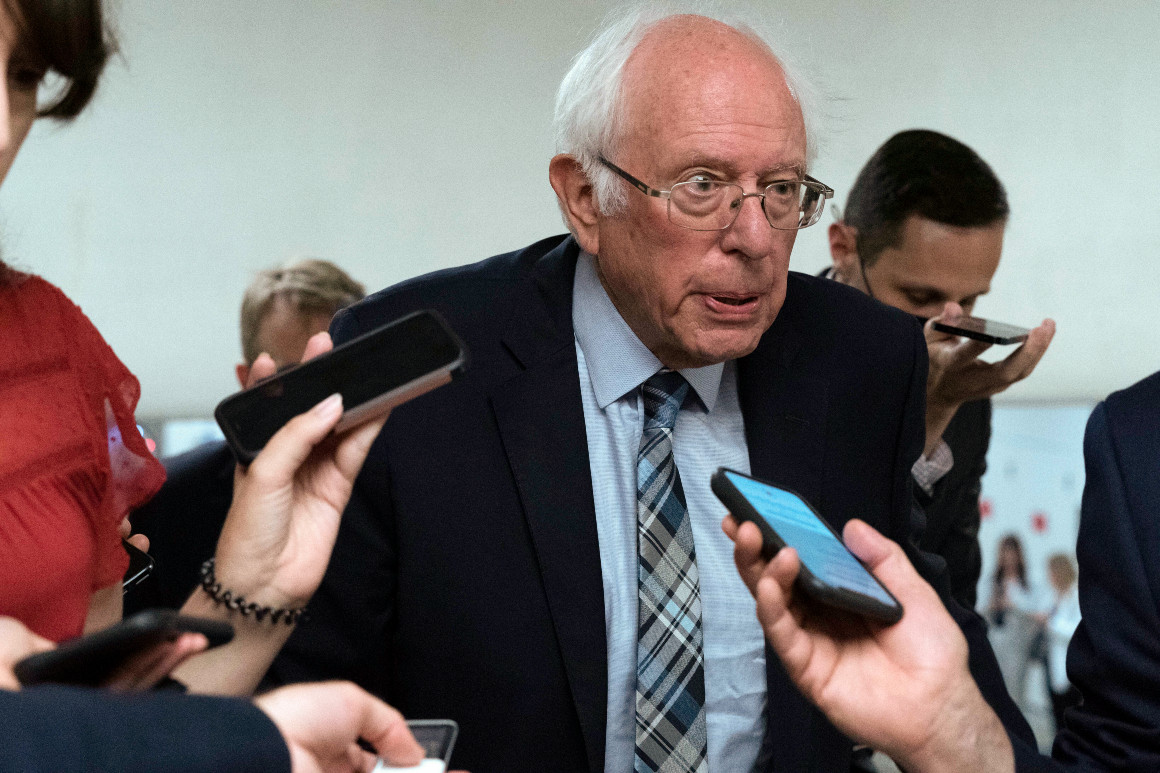 bipartisan $1.2 trillion package through regular order while also passing a far more ambitious $3.5 trillion package—including social and economic infrastructure like universal pre-K—through budget reconciliation. The path forward for the larger package is even less clear. It remains to be seen how the Senate Parliamentarian will rule on large parts of the package. For weeks, Committee chairs have been bouncing specific policy language off the Parliamentarian’s Office to try and predict rulings. The reality is that many progressive priorities may have to be pared down before they can be passed through reconciliation. Furthermore, the pay-fors in the reconciliation package are even more complex and controversial. The most controversial for both sides of the aisle is dynamic scoring (a method of estimating the future fiscal implications of the bill to lessen the money needed to pay for it.) Senate Budget Chairman, Vermont Senator Bernie Sanders, has called dynamic scoring “cooking the books” in the past (in reference to former President Donald Trump’s 2017 tax cuts), and former President George H. W. Bush called it “voodoo economics.” In short, expect to see some fireworks on reconciliation in the coming weeks.
bipartisan $1.2 trillion package through regular order while also passing a far more ambitious $3.5 trillion package—including social and economic infrastructure like universal pre-K—through budget reconciliation. The path forward for the larger package is even less clear. It remains to be seen how the Senate Parliamentarian will rule on large parts of the package. For weeks, Committee chairs have been bouncing specific policy language off the Parliamentarian’s Office to try and predict rulings. The reality is that many progressive priorities may have to be pared down before they can be passed through reconciliation. Furthermore, the pay-fors in the reconciliation package are even more complex and controversial. The most controversial for both sides of the aisle is dynamic scoring (a method of estimating the future fiscal implications of the bill to lessen the money needed to pay for it.) Senate Budget Chairman, Vermont Senator Bernie Sanders, has called dynamic scoring “cooking the books” in the past (in reference to former President Donald Trump’s 2017 tax cuts), and former President George H. W. Bush called it “voodoo economics.” In short, expect to see some fireworks on reconciliation in the coming weeks.
And while most everyone in D.C. is talking infrastructure, we are also heading toward a September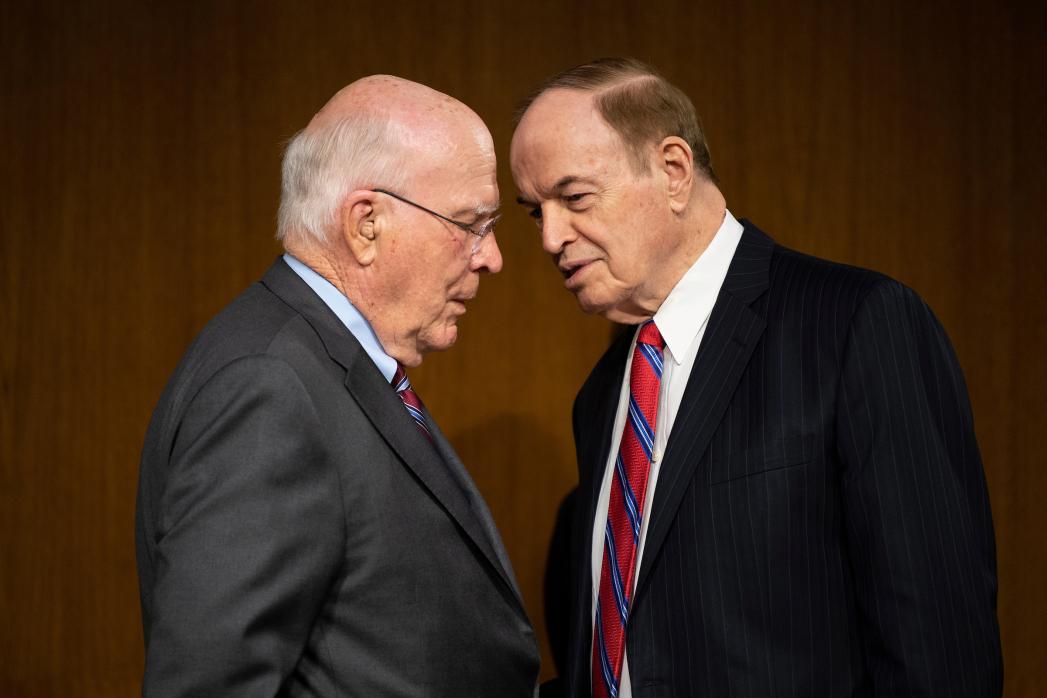 30th deadline for Federal Fiscal Year 2022 Appropriations. House Democrats are planning to bring a giant spending package to the floor in the next two weeks, the chamber’s first move toward avoiding government funding drama before the fall deadline. The package, aka the “minibus,” will include seven out of the 12 appropriations bills, encompassing a huge swath of federal spending from health programs to agriculture to the Treasury. The package leave out the five most contentious bills, which cover more controversial policy areas like immigration and policing (the bills that will not be included in the minibus are: Defense, Homeland Security, State-Foreign Operations, Legislative Branch, and Commerce-Justice-Science). Complicating matters on the Senate side, the top Appropriators—Republican Senator Richard Shelby of Alabama and Democratic Senator Patrick Leahy of Vermont—are squabbling over how to allocate the first tranche of Congressionally Directed Spending or “earmarks” available to lawmakers in over ten years. Shelby is demanding the funds be split evenly between Democratic and Republican Senators, and Leahy has refused to commit to such a framework.
30th deadline for Federal Fiscal Year 2022 Appropriations. House Democrats are planning to bring a giant spending package to the floor in the next two weeks, the chamber’s first move toward avoiding government funding drama before the fall deadline. The package, aka the “minibus,” will include seven out of the 12 appropriations bills, encompassing a huge swath of federal spending from health programs to agriculture to the Treasury. The package leave out the five most contentious bills, which cover more controversial policy areas like immigration and policing (the bills that will not be included in the minibus are: Defense, Homeland Security, State-Foreign Operations, Legislative Branch, and Commerce-Justice-Science). Complicating matters on the Senate side, the top Appropriators—Republican Senator Richard Shelby of Alabama and Democratic Senator Patrick Leahy of Vermont—are squabbling over how to allocate the first tranche of Congressionally Directed Spending or “earmarks” available to lawmakers in over ten years. Shelby is demanding the funds be split evenly between Democratic and Republican Senators, and Leahy has refused to commit to such a framework.
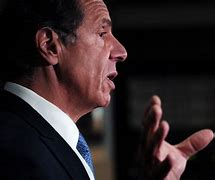 Assembly Judiciary Committee (who is also leading the Assembly’s impeachment inquiry), Charles Lavine, warned Gov. Andrew Cuomo that a tweet by Cuomo’s spokesperson Rich Azzopardi was an attempt to undermine her investigation and could amount to witness suppression. The Governor’s outside counsel, not surprisingly, disagreed. A number of legislators came to Lavine’s defense. “This is exactly what they’ve always done. It’s the bullying. It’s the intimidation. It’s the trying to discredit people and the fact that my colleague, Charles Lavine, had to even write that letter. It’s outrageous, absolutely outrageous, and it speaks to the fact that this governor should not be in the position that he’s in right now,” said Assemblyman Angelo Santabarbara.
Assembly Judiciary Committee (who is also leading the Assembly’s impeachment inquiry), Charles Lavine, warned Gov. Andrew Cuomo that a tweet by Cuomo’s spokesperson Rich Azzopardi was an attempt to undermine her investigation and could amount to witness suppression. The Governor’s outside counsel, not surprisingly, disagreed. A number of legislators came to Lavine’s defense. “This is exactly what they’ve always done. It’s the bullying. It’s the intimidation. It’s the trying to discredit people and the fact that my colleague, Charles Lavine, had to even write that letter. It’s outrageous, absolutely outrageous, and it speaks to the fact that this governor should not be in the position that he’s in right now,” said Assemblyman Angelo Santabarbara. FOR DAILY UPDATES, FOLLOW US:
Client News
 Blockchain Company Chief Says North Tonawanda Power Plant Deal Would Create Jobs
Blockchain Company Chief Says North Tonawanda Power Plant Deal Would Create Jobs
The president of Digihost, a Canadian blockchain company, said this week that his planned $3.5 million purchase of a North Tonawanda power plant would create jobs. [Read more.]
Where is Gov. Cuomo?
He’s been invisible, off the radar, radio silent, ever since he was reportedly questioned by lawyers working on the attorney general’s investigation of his alleged sexual harassment or sexual abuse of some ten women. [Read more.]
Ethics Agency Investigating Cuomo Aide’s Calls
An investigator from the Joint Commission on Public Ethics has been contacting Democratic county executives around New York to set up fact-finding interviews concerning their interactions with Larry Schwartz, who is one of Cuomo’s most trusted advisers and had served as New York’s “vaccine czar” during the height of the COVID-19 pandemic, according to people familiar with the matter. [Read more.]
The Long Evolution of the Cocktail
What, actually, is a cocktail? It’s one of those words you can use hundreds of times in your life without ever asking where it comes from. In 19th-century America, cocktail was far from the only word for mixed alcoholic drinks. [Read more]
 Blockchain Company Chief Says North Tonawanda Power Plant Deal Would Create Jobs
Blockchain Company Chief Says North Tonawanda Power Plant Deal Would Create Jobs


